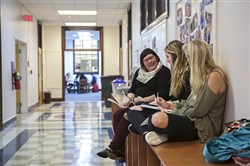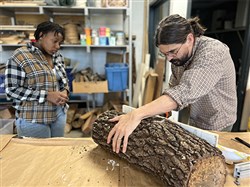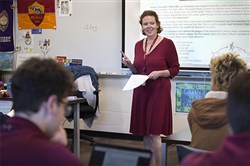VOL. 46 | NO. 40 | Friday, October 7, 2022
Veteran teachers a point of pride
By Kathy Carlson
Sarah Ellery arrived at Montgomery Bell Academy fresh out of college and ready to teach Latin. The plan was to stay a few years, earn a doctoral degree and then teach at the college level, as her father had.
Instead, she has stayed at the school 19 years. “I found it to be my home,” she says on a bright fall afternoon as classes wound down for the week.
Although long careers aren’t unusual at Nashville private schools, recruiting and retaining teachers often remains top of mind both for schools and families.
“The teacher is the face of the school to the parent,” says Mimi Bliss, who serves on the board of trustees of University School of Nashville and whose son recently graduated from USN after attending from kindergarten to senior year. “Teachers are important to parents the whole way through.”

University School of Nashville English teacher Freya Sachs, speaks with students in the hallway.
-- Photograph Provided“You’ve got to stay focused on people,” says MBA Headmaster Brad Gioia. That means taking an interest in students and building the connections that will continue to foster a strong faculty.
“The best thing I can do is really value teachers; pay them well, provide good benefits, make the culture strong and meaningful, and that typically wins the day,” he says. It doesn’t necessarily make it easier to find teachers, but it makes it possible to attract teachers who serve as “beacons of interest and light” to students.
To Quinton Walker, head of high school at USN, “the most important job is teacher; it’s the hardest job, without a doubt.
“I think families choose to be in a place where they know their kids will be affirmed, cared for, and pushed and challenged academically, and that’s what we do,” he says. “We hold kids to the highest standards, and I think those are the reasons why [USN] teachers really make a significant difference when families look at us.”
Both Gioia and Walker continue to teach at their schools. Walker will teach a history course in the spring semester at USN and also teaches a course on school leadership at Peabody College at Vanderbilt. Gioia, in his 29th and final year at MBA and an English teacher, will team-teach in one class every week in the spring. He will retire at the end of June next year.
Sarah Wilson, executive director of the Tennessee Association of Independent Schools, says the faculty is “one of several things that are key pieces of identity to independent schools.” Those schools tend to offer “really strong teacher mentorship and onboarding programs,” which helps the schools attract and retain faculty members. There are 61 TAIS member schools in which more than 36,000 students from age 2 to grade 12 are enrolled this academic year, she points out.
Independent schools are one subset of private, nonpublic schools. The general rule of thumb is that an independent school is run by an independent governing board and is independent in its philosophy and mission, Wilson says. Other types of private schools are Catholic schools, non-Catholic Christian schools and other religious schools.
The state of Tennessee, on its website, includes homeschool umbrella programs as nonpublic schools, and says there are more than 600 such schools or programs in the state. The state recognizes five different categories of nonpublic schools, and requirements for teaching in them will vary depending on the category. Often, teacher standards are set by the body that accredits the school.

USN art teacher Andy King shows a student in his wood sculpture class how to use the router to cut a log and build a box. The boxes built will be used to create sculptures.
-- Photograph ProvidedMany teachers at area private schools start their education careers straight from college. Others shift from public to private schools, and still others come to teaching from careers in business, law, government and other fields.
Many private schools will work with teacher search firms, often national firms, to recruit teachers, Gioia says. Some teachers are hired directly from college and others are hired through word of mouth from people connected with the school.
“We all depend on word of mouth,” he says. “People who know teachers at our school are often good sources for hiring, both locally and beyond the state.”
Most of MBA’s teachers have taught there for some years, Gioia says, but the school hires new college graduates each year both to enrich the faculty and so new teachers can learn from veteran teachers. Increasingly, people choose to enter teaching after having pursued another career, he says.
MBA looks for empathetic teachers, with an interest in the school, the subject they teach and the students, Gioia notes. Teachers not only help students learn the subject matter in which they specialize; they also coach sports or act as advisers to other extracurricular activities.
Average teacher tenure in the high school at USN is 18 years, Walker says.
He mentions three main qualities the school values in recruiting. First is “deep content knowledge and expertise in field.” USN also seeks a commitment to how to teach, shown in a forward-looking perspective, an embrace of best teaching practices and an interest in trying new things. The third factor, he says, is a “real desire to be with and support students” and contribute to the school.
USN posts job openings on job boards within the independent school community, works with contract search firms and also recruits and interviews at career fairs.
Five people will separately review each USN candidate’s resume, then selected candidates are asked to send a writing sample or lesson plan. The strongest three or four candidates spend a day at the school, including a one-hour session with students, usually juniors and seniors, who have been taught how to conduct interviews. Walker introduces the candidate to the students and then he walks away. Later, the students sum up their time with the candidate.
Involving students in interviews with potential faculty members is “fairly unique; it comes from us and our mission. This is as much (the students’) community as it is ours,” he says.

Latin 5 Honors teacher Sarah Ellery has been teaching latin at MBA for 19 years.
-- Photo By Michelle Morrow | The LedgerEllery says she applied to teach at MBA because of a personal connection, through her adviser at her undergraduate school to an MBA faculty member who taught classics. She earned her master’s degree in Latin through a summers-only program at the University of Georgia, but a combination of curious and engaged students and colleagues who have become her friends have kept her at MBA.
One of the best things about her job, she adds, is being able to work in small groups with students and really get to know them and their individual learning styles. She teaches four classes with a total of 51 students.
Lakresha Easley has been an English teacher for five years, first to 9th graders at a charter school in Ohio and now at Montgomery Bell Academy, where she teaches four classes to 7th graders. Her husband, an MBA graduate, also teaches at the all-boys school. They’ve both been there for two years. She and her husband – they married in June – met at the charter school, where both taught.
One of her courses at MBA focuses on grammar and vocabulary; in the other, students study literature and composition, tackling writing assignments and reading short stories and novels such as “To Kill a Mockingbird” and “The Hobbit.” She also coaches swimming.
She says she’s blessed to be able to work at the same school as her husband, be on the same schedule and have a built-in support system at the school he attended. She also had a mentor in her first year at MBA, another English teacher she described as “amazing.”
Her move to Nashville and MBA was “God-ordained,” she says, and the MBA community has become a second family to her. The 50 seventh-graders she teaches in four separate classes are respectful and “understand what it means to be a student. They love to learn, and it allows me to be the best teacher.” MBA is a teacher’s dream, she says. She can be true to her soft-spoken style and have students take her seriously both as a coach and a teacher.
Robert Cousins teaches first-year geometry to freshmen and sophomores. He has four sections and a total of 60 students, 13 to 16 in each class. This is his first year at MBA. He also coaches the riflery team.
Originally from Dallas, Cousins graduated from Vanderbilt and then worked in Washington on the staff of a Texas congressman. After six years, Cousins returned to Vanderbilt for an M.B.A. degree and worked for management consulting and healthcare firms. The work was challenging and very rewarding, he says.
Teaching had been in the back of his mind. “I always thought I’d be a teacher,” he says. Both of his brothers are teachers, as are his wife and father-in-law.
“I think it fits my personality,” he says of teaching. He likes sharing his experiences and expertise with students, a part of the job he realizes he always enjoyed before he became a teacher.
“I was always good at math,” he says. “Geometry is perfect for me. It’s just logical; it flows nicely and builds sequentially.” He enjoys seeing students think through mathematical arguments and proofs, seeing connections and experiencing those small but rewarding “eureka” moments.
Ellery, the Latin teacher, says she enjoys knowing people from several different generations, all part of a community of learning. “I get to help all of these young people reach their potential,” she says. She also can keep growing and learning and can work with people who, throughout their careers, are excited about what they do and what they’re learning.
“I realized after COVID how much I value being in a community,” she said. COVID also reminded people that children learn best as part of a community, she explains.
Asked how he sees his career path, Cousins just smiles and says, “I’m enjoying this so much.” His students are “funny, smart, driven; they make you laugh,” he says, and the faculty “is fantastic.”
“I think independent schools grow leaders,” says Wilson of TAIS. “…Independent schools tend to be willing to help teachers continue to learn and grow in their profession. That makes careers rewarding to the teachers and helps in retention.”